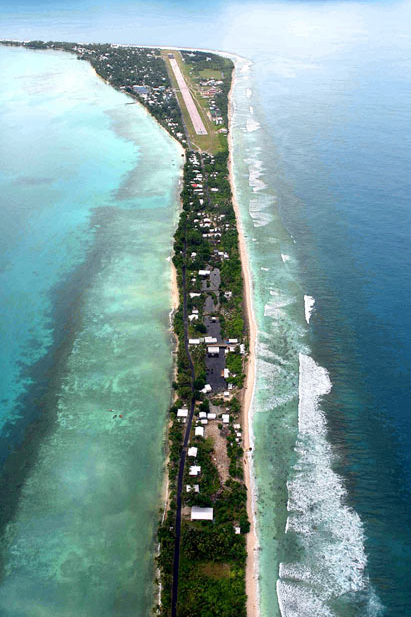Tuvalu urges fossil stop
 Pacific islands nations have called for a fossil fuel non-proliferation treaty.
Pacific islands nations have called for a fossil fuel non-proliferation treaty.
At this week’s COP27 climate summit in Egypt, the island nation of Tuvalu has demanded an international fossil fuel non-proliferation treaty, which would phase out the use of coal, oil and gas.
Tuvalu is acutely vulnerable to sea level rises caused by global heating, and is the second country to call for an agreement to end the era of burning fossil fuels, following fellow Pacific nation Vanuatu.
Climate activists have welcomed the call, condemning large polluters such as the US and China for ensuring that fossil fuels remain protected in previous iterations of the climate talks.
Last year, at COP26 in Scotland, countries were only able to agree to “phase down” the use of coal, and the use of gas and oil was not mentioned.
Kausea Natano, the prime minister of Tuvalu, said; “The warming seas are starting to swallow our lands, inch by inch. But the world’s addiction to oil, gas and coal can’t sink our dreams under the waves”.
“We, therefore, unite with a hundred Nobel peace prize laureates and thousands of scientists worldwide and urge world leaders to join the fossil fuel non-proliferation treaty to manage a just transition away from fossil fuels,” the PM said.
“Countries like Tuvalu are the ones on the frontlines, they know they can’t just give in to the vested interests of the fossil fuel companies,” said Harjeet Singh, head of global political strategy at Climate Action Network International.
“We know who the victims of the climate crisis are and we know who the perpetrators are but we don’t ever discuss fossil fuels, the elephant in the room.”
Proponents say that a fossil fuel treaty would curb new exploitation of reserves and switch in a just way to renewables, but has so far been overlooked “by design”, as several powerful countries still rely on digging up and burning fossil fuels.
Despite the International Energy Agency warning there can be no new coal, oil or gas infrastructure built if the world is to avoid disastrous global heating, an explicit agreement to wind down fossil fuel use is not a priority for governments at the summit.
Tuvalu and Vanuatu are examples of nations already feeling the effects of emissions they did not release.
A new report released during COP27 this week showed African countries, which are the least responsible for the global climate crisis, could see their GDP growth rate fall by up to 64 per cent by the end of the century, due to climate change.
The study commissioned by Christian Aid found that burning fossil fuels at the current rate will have a huge impact on the finances of African countries, reducing GDP per capita by as much as 34 per cent, leading to an average 20 per cent reduction in rates by 2050 and a huge 64 per cent on average by 2100.







 Print
Print